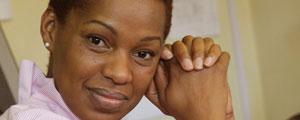
Let me tell you how I came to conclude that one of the biggest problems we have in society is men’s empowerment. LOCAL DRUMMER WITH THEMBE KHUMALO
It started innocently enough. I was reading through notes I had made at some women’s empowerment event and there were a couple of lines about engaging men, and the changing face of masculinity.
This got me thinking, and I considered the volume of conversation taking place about women, about their needs, their rights, and their role in a patriarchal society.
I wondered if the same level of introspection was taking place among men, and decided to go to the source to find out what it means to be a man. I canvassed friends, acquaintances, and friends of friends; banned my girlfriends from contributing and searched for those special qualities that men believe really make them . . . well, men.
It was by no means a scientific survey, but I purposefully chose men from different walks of life, a wide range of age groups, asking them the simple question: “What does it mean to be a man?” I found nothing. No, I don’t mean the men had nothing to say. I mean that what they had to say seemed not so very different from what women would have said about being women.
The very first response I got said: “A man is a protector and provider that looks after and shows love to his family, friends and community at large . . .” This response didn’t surprise me, but what I didn’t expect was the frequency with which the themes of protecting and providing would come up.
This is consistent with the principle that the man is the head of the home. The physical, emotional and psychological constitution of a man is naturally designed to play that role. What it means to be a man is that, within the family unit he must also be a source of vision and wisdom.”
Even though he did not elaborate on what was expected of women in this complementary universe, he was clear that the man was required to provide and to lead. Logically, my next question was: “Why do you think these qualities are uniquely male?” Do women not also protect, provide and lead?”
- Chamisa under fire over US$120K donation
- Mavhunga puts DeMbare into Chibuku quarterfinals
- Pension funds bet on Cabora Bassa oilfields
- Councils defy govt fire tender directive
Keep Reading
I didn’t get to ask all the respondents that question, but the few that I did, responded by insisting that the traditional roles of male and female required these qualities of men and not of women.
The most articulate argument said: “In that construct, a man is someone who fits into the ascribed roles of a man, hence the Shona saying mukadzi uyu murume pachake. Being a man from a traditional perspective is being able to provide and protect. The ability to satisfy the emotional, physical and financial needs of a partner is central to manhood. That can explain why the rich madam can tell her hubby that garden boy murume chaiye.
My conclusion from these conversations was that there is nothing uniquely male about being a man. Beyond the limitations of biology, the roles and expectations of manhood can just as easily be ascribed to and performed by women.
Apart from the roles of providing and protecting, there were those who spoke about boldness, risk taking, aggression and courage. They referenced slaughtering of beasts, stick fighting, and circumcision.
But, (having slaughtered a couple of goats and countless chickens myself) I still saw no reason why these qualities were unique to men.
So if men and women are so similar, what then is the problem that leads to all the gender conflicts we endure as a race? It is simply this:
Although our abilities and capabilities are very similar, the balance of power is skewed in favour of men. The control of resources rests with only one half of society, yet the other half is similarly capable of managing those resources. When you are overly-empowered, only one half of a community of equals, you are bound to have trouble.
The problem we have, therefore, is men’s over-empowerment!











